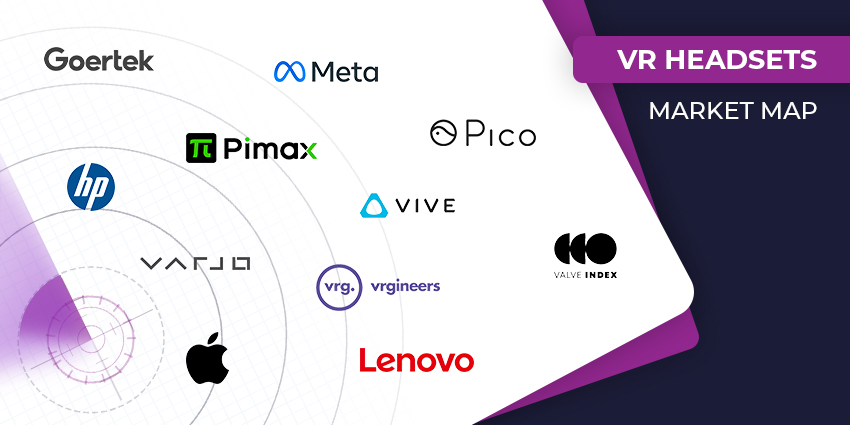While the metaverse is still at least ten years away, VR content volumes are exploding. Between 2020 and 2025, the VR content market will grow by 160%.
Headset numbers are also set to steadily increase, and VR is the fastest growing media segment right now, ahead of OTT video, podcasts, and even cinema.
So, what does this mean in terms of content licensing and royalties?
Given that the metaverse is a fully decentralised platform with no singular owner or dominant operator, how can we ensure that licensing is fair and transparent? These questions must be asked – and answered – in these early days of the metaverse.
Right now, different companies like Microsoft, Facebook, Epic Games, and Decentraland are working on metaverse experiences of their own.
As we move towards some degree of convergence and interoperability in the next 10-15 years, clear content licensing rules have to be instituted.
How Is Ownership in the Metaverse Different from the Real World?
The challenges around content licensing in the metaverse arise from ambiguity of ownership.
The metaverse refers to a 3D VR space that’s populated by content (digital objects, ads, media, characters, tools, and experiences) designed by a decentralised community of creators.
Users can enter this unified VR world using human-computer interaction (HCI) gear, and engage with each other as well as the world around them.
Going by our current definition of the metaverse, most of the ownership in this space will be determined through non-fungible tokens or NFTs. NFTs are blockchain-based digital assets that carry immutable information about a particular good or service and are non-interchangeable in nature.
This means that you cannot replace one NFT with another (just like you can’t replace a work of art with another), which is what endows NFTs with their intrinsic value.
But the problem with NFTs is that they don’t exactly replicate the real-world dynamics of content ownership. Yes, they do define the precise terms of what the content entails better than is possible through traditional digital technology.
However, this falls short of conferring actual ownership. You can’t:
- Alter the content as per your preference; e.g., you could doodle over a physically painted masterpiece
- Track provenance beyond a point and establish accountability, if the NFT has changed hands 50+ times
- Be assured of a consistent price and increase in valuation, as the market is extremely volatile
This is what makes content licensing a major concern for the virtual world – fortunately, there are some early measures companies can adopt.
Possible Licensing Tactics Companies Can Explore
There’s no avoiding large-scale content utilisation in the metaverse.
Already, Facebook has come up with its Presence Platform that makes it easier for VR designers and developers to create immersive content experiences for Quest. There’s also an offering called Horizon Worlds that lets you build VR inside VR.
Like the internet, the metaverse will rely hugely on both expert-created and user-generated content (UGC) to provide an enriching experience to the global user community.
To iron out licensing issues, companies can consider:
Real estate sales as NFTs
Digital objects, like trophies you won in a VR game, may not be a good candidate for NFT. Real estate, on the other hand, is a wholly different ball game.
VR real estate inside the metaverse has proved to be extremely valuable and there is significant market demand.
Recently, a plot of land in the Decentraland platform sold for a staggering $2.3 million. Land inside the metaverse also counts as content – or, more accurately, a blank content canvas that is extremely profitable owing to certain parameters like location.
Therefore, converting these into NFTs could help clarify ownership and cement the value of paying for the license to use the property.
Fan-art policy to manage user-generated content
User-generated content was always problematic for digital content licensing, and it will continue to be so in the metaverse.
Let’s say a VR game player has designed their own outfit with the logo of a particular brand. Should they have to pay for walking around in the metaverse?
Or, does it count as free advertising for the brand? Some brands think it is the former which is why Nike has filed a trademark application for all downloadable versions of its goods.
Others might want to come up with a fan-art policy to regulate content licensing for UGC purely for non-commercial purposes.
Taxation policies for the metaverse
Here’s where regulatory bodies must intervene. Transactions in the metaverse have to be clearly classified to determine tax jurisdiction. Does a transaction constitute a sale or the transferring of a license? Is it a national or international transaction? Does it fall under consumer law or B2B law?
As prices fluctuate inside the metaverse, companies require stable taxation policies and a system to obtain tax advice for the various types of goods and services it is offering for sale or lease.
A Thorny Problem: How to Measure ROI?
As content licensing in the metaverse evolves, companies and content creators could run into yet another issue – how do you measure the returns from your investment, either as a content creator or license buyer?
Additionally, licensing parties could encounter questions like:
- Which territorial law will govern content licensing in the metaverse? We may need separate rules like those applicable when travelling by air.
- How does a content license work where there is multiple third parties involved? Separate unions may be required so that content creators working on a singular licensed product can negotiate fees.
Since the early days of the internet, modern forms of marketing attribution and ROI analysis took several years to develop.
Similarly, it will take time before there is a proper ROI management framework for the metaverse.
This framework will help to obtain insights on the chain of ownership and profitability, so that the license owner, provider, and the content creators involved can be compensated in an equitable manner.
However, owing to the transparent and decentralised blockchain architecture of the metaverse, there could be fewer bottlenecks in the long term than faced in our current iteration of the worldwide web 2.0.






